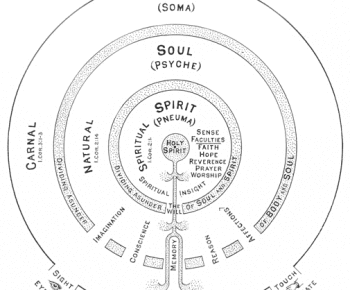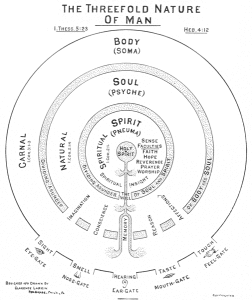
There are many differing views in regards to the “soul” and “spirit” of man. The Bible teaches that humans have a body and a spirit. This body and spirit are one soul. So the soul is not the same as the spirit; however, the word “soul” is an expression of the spirit and the body united as one. The usage of the words “soul” and “spirit” vary depending on the sentence. The Bible writers are not using dogmatic definitions every time they convey a thought; so, words need to be interpreted according to its usage.
The definitions of “soul” and “spirit” in the Bible
The words “soul” and “spirit” have different meanings depending on the context in the Bible.
“Soul” in the Old Testament
The following word is used in the Old testament for the word “soul.”
<05315> נֶפֶשׁ (nephesh) (659b)
Meaning: a soul, living being, life, self, person, desire, passion, appetite, emotion
From a cursory glance at the usage throughout the Bible, the word “soul” means a living being or person which is both the body and the spirit.
And the LORD God formed man of the dust of the ground, and breathed into his nostrils the breath of life; and man became a living soul. (Gen 2:7 KJV)
But the man that is clean, and is not in a journey, and forbeareth to keep the passover, even the same soul shall be cut off from among his people (Num 9:13 KJV)
Hate evil, you who love the LORD, Who preserves the souls of His godly ones; He delivers them from the hand of the wicked (Psa 97:10 NAS)
For Thou wilt not abandon my soul to Sheol; Neither wilt Thou allow Thy Holy One to undergo decay. (Psa 16:10 NAS)
And it came about when the sun came up that God appointed a scorching east wind, and the sun beat down on Jonah’s head so that he became faint and begged with all his soul to die, saying, “Death is better to me than life.” (Jon 4:8 NAS)
In the previous passages we see that a “soul” is a person whose body is killed and loses life or his spirit.
“Spirit” in the Old Testament
The following word is used in the Old testament for the word “spirit.”
<07307> רוּחַ (ruach) (924c)
Meaning: breath, wind, spirit
This is the “life” within the person.
Thou dost hide Thy face, they are dismayed; Thou dost take away their spirit, they expire, And return to their dust. (Psa 104:29 NAS)
His spirit departs, he returns to the earth; In that very day his thoughts perish. (Psa 146:4 NAS)
Then the dust will return to the earth as it was, and the spirit will return to God who gave it. (Ecc 12:7 NAS)
The word “spirit” also means the mind, desires, and will of the person.
It is better to be of a humble spirit with the lowly, Than to divide the spoil with the proud. (Pro 16:19 NAS)
And also with the contrite and lowly of spirit In order to revive the spirit of the lowly And to revive the heart of the contrite. (Isa 57:15 NAS)
For a spirit of harlotry has led them astray, And they have played the harlot, departing from their God. (Hos 4:12 NAS)
The previous passages show that the “spirit” of man is his life, mind, and will.
“Soul” in the New Testament
The following word is used in the New testament for the word “soul.”
<5590> ψυχή (psuche)
Meaning: breath, the soul
In the New Testament, because the Greek language the word “ψυχή (psuche)” is used differently than the Hebrew word “נֶפֶשׁ (nephesh).” In the New Testament word “soul” can mean, person, life, or spirit when translated from the Greek.
And do not fear those who kill the body, but are unable to kill the soul; but rather fear Him who is able to destroy both soul and body in hell. (Mat 10:28 NAS)
“For what does it profit a man to gain the whole world, and forfeit his soul? “For what shall a man give in exchange for his soul? (Mar 8:36-37 NAS)
And you shall love the Lord your God with all your heart, and with all your soul, and with all your mind, and with all your strength.’ (Mar 12:30 NAS)
For the word of God is living and active and sharper than any two-edged sword, and piercing as far as the division of soul and spirit, of both joints and marrow, and able to judge the thoughts and intentions of the heart. (Heb 4:12 NAS)
Now may the God of peace Himself sanctify you entirely; and may your spirit and soul and body be preserved complete, without blame at the coming of our Lord Jesus Christ. (1Th 5:23 NAS)
So, the previous passages show that “soul” and “spirit” are used interchangeably to mean the same thing and they are also used to mean different things. This is because of the Greek language usage.
“Spirit” in the New Testament
The following word is used in the New testament for the word “spirit.”
<4151> πνεῦμα (pneuma)
Meaning: wind, spirit
The New Testament usage of the word “spirit” refers to the metaphysical person like an angel.
Now when the unclean spirit goes out of a man, it passes through waterless places, seeking rest, and does not find it. (Mat 12:43 NAS)
See My hands and My feet, that it is I Myself; touch Me and see, for a spirit does not have flesh and bones as you see that I have.” (Luk 24:39 NAS)
“We find nothing wrong with this man; suppose a spirit or an angel has spoken to him?” (Act 23:9 NAS)
For who among men knows the thoughts of a man except the spirit of the man, which is in him? Even so the thoughts of God no one knows except the Spirit of God (1Co 2:11 NAS)
In the name of our Lord Jesus, when you are assembled, and I with you in spirit, with the power of our Lord Jesus, I have decided to deliver such a one to Satan for the destruction of his flesh, that his spirit may be saved in the day of the Lord Jesus. (1Co 5:4-5 NAS)
The word “spirit” also can refer to a person’s attitude or frame of mind.
That the God of our Lord Jesus Christ, the Father of glory, may give to you a spirit of wisdom and of revelation in the knowledge of Him. (Eph 1:17 NAS)
Make my joy complete by being of the same mind, maintaining the same love, united in spirit, intent on one purpose (Phi 2:2 NAS)
For God has not given us a spirit of timidity, but of power and love and discipline. (2Ti 1:7 NAS)
So in the Old Testament, the “soul” is a person, both, body and spirit. The “spirit” is the inner life, mind, will, and desire of a person. The New testament is similar, except, occasionally, the word “ψυχή (psuche) or soul” and the word “πνεῦμα (pneuma) or spirit” are used inconsistently. Sometimes they are used separately like in 1 Th 5:23 and sometimes they are interchanged like in Mat 10:28.
The “dichotomy” or “trichotomy” of man
There are two prevalent views called the “dichotomy” or “trichotomy” of man. Both these views are taught by many over the entire existence of the church.
The “dichotomy” of man is the teaching that humans only have a body and spirit. There are two general views of this. The first is the soul is the combination of both spirit and body. The other is the spirit and the soul are the same.
Both the Orthodox Reformed and the Roman Catholics teach that humans are only a spirit and a body.
The Catechism of the Catholic Church, Part 1, Section 2, Chapter 1, Article I, Paragraph 6. Man
The Orthodox Presbyterian Church – Are soul and spirit the same?
The “trichotomy” of man is the teaching that humans are three separate entities, the body, soul, and spirit. In this view the spirit and soul are two separate parts of a human being. This view can be found throughout church history.
The Soul, Spirit, and Mind and the Trinity
Some try to use the following passages to prove that the soul, spirit, and body are how we are created in the Trinitarian image of God.
Now may the God of peace Himself sanctify you entirely; and may your spirit and soul and body be preserved complete, without blame at the coming of our Lord Jesus Christ. (1 Th 5:23 NAS)
For the word of God is living and active and sharper than any two-edged sword, and piercing as far as the division of soul and spirit, of both joints and marrow, and able to judge the thoughts and intentions of the heart. (Heb 4:12 NAS)
An example of this is in the book Dispensational Truth by Clarence Larkin. In the chapter on “The Threefold Nature of Man,” Clarence Larkin uses 1 Th 5:23 and Heb 4:12 to construct an entire graphic on his view of the trinity and creates the concept of “The Carnal Christian.”

The problem with this is that the Bible clearly teaches that God is not a man (Num 23:19) nor does he have a body (John 4:24, 1 Ti 1:17). Another problem with the “threefold nature of man” is the teaching that God is three parts, which is clearly not Orthodox.
The teaching that the Mind (Father), Word (Son), and Will (Spirit) is the Trinity and is fully explained by Tertullian and Saint Augustine. Please see,
Quotes from the Early Church Fathers: Man in God’s image and the Trinity
The view Augustine and Tertullian put forth has not been fully accepted throughout church history. Some consider it too “reasoned” and not just accepted by “faith.” Most of the other views of man being created in the image of God fall into serious error in regards to the Trinity.